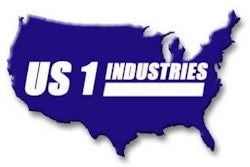
The federal government must provide the leadership and resources necessary to facilitate the safe and efficient movement of goods on the nation’s highway system, American Trucking Associations Senior Vice President Tim Lynch told Congress Tuesday, March 16.
In his testimony before the U.S. House of Representatives Appropriations Subcommittee on Transportation, Housing and Urban Development, and Related Agencies, Lynch said the United States no longer can afford to spend limited federal resources on projects that do not meet important national goals. “The United States has been living off the transportation infrastructure built by past generations,” he said. “Our failure to keep up with the demands imposed on these systems by population and economic growth has weakened the nation’s competitive position relative to other countries.”
Congress seemingly got the message as the U.S. Senate today, March 17, voted 68-29 on the jobs bill that includes a $20 billion infusion into the Highway Trust Fund to keep it funded through the end of 2010. The measure went to President Obama, who was set to sign it into law Thursday, March 18.
The measure will provide a temporary payroll tax break for companies that hire workers who have been unemployed for at least 60 days. Companies would be exempt from paying the 6.2 percent Social Security payroll tax through December. The U.S. House of Representatives already had passed similar legislation March 4.
The bill’s passage was not without controversy. The Senate on March 2 voted 78-19 to pass a $10 billion measure to fund highway projects and extend unemployment benefits through the end of March after Republican Sen. Jim Bunning of Kentucky agreed to end his filibuster demanding a way to pay for it first. The original short-term extension of unemployment benefits needed unanimous consent to pass because Democrats labeled it an emergency spending measure, but Bunning had rejected the motion for unanimous consent.
The current surface transportation authorization act – the Safe, Accountable, Flexible, Efficient, Transportation Equity Act: A Legacy for Users (SAFETEA-LU) – was due to expire Sept. 30, 2009, but has been kept alive by a series of extensions while Congress considers a replacement authorization bill.
The expiration of one of those extensions at midnight, Sun. Feb. 28, forced two-day employee layoffs at the U.S. Department of Transportation, including the Federal Motor Carrier Safety Administration, Federal Highway Administration, National Highway Traffic Safety Administration and the Research and Innovative Technology Administration while Bunning continued his filibuster.
U.S. Rep. Jim Oberstar (D-Minn), who chairs the House Committee on Transportation and Infrastructure, is moving ahead with work on a new transportation funding bill to fund all of the nation’s road, bridge and public transportation projects for the next six years.
America’s aging infrastructure is in desperate need of repair and expansion, Lynch testified Tuesday before the House committee; congestion costs, caused by inefficiencies in the system, rapidly are approaching $100 billion annually, and eliminating bottlenecks on our highways and at our ports and border crossings will enhance America’s competitive positioning greatly. “Failing to address growing congestion problems will cause costs to rise, translating into higher consumer prices and slower job growth, weakening the United States’ ability to compete in the global economy,” Lynch said.
Necessary highway improvements come at an enormous cost, and ATA believes that increasing the fuel tax is the only viable solution to the current highway funding crisis that now is available, Lynch testified; trucking companies are willing to support an increase in their highway user fee payments, provided the revenue is dedicated to funding projects that address the most critical highway needs.
In his testimony, Lynch also said the United States has the most restrictive truck weight regulations of any developed country, and easing these limitations would deliver strong economic, environmental and safety benefits. To take advantage of the benefits that productivity increases can deliver, Congress must reform its laws to give states greater flexibility to change their size and weight regulations with oversight by FHA, Lynch testified.












